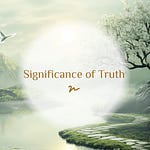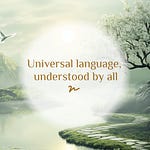🎧 Please listen to the audio using the player above.☝️
In the fourth episode of Nectar of Peace, we explore the world of karma - often regarded in the Western world as part of Eastern religions, or even something mystical or exotic. But as we will learn, karma, or causality, applies to all of us, regardless of where we live or which religion or culture we belong to.
What you’ll hear in this episode:
The meaning of the word “karma”
When do our actions inevitably lead to consequences?
Good, bad, and mixed karma
The root of everything we are and have
Understanding karma, as natural law, makes life easier
My name is Mitja Žibert, and I’ll be your host on this podcast, which serves as an invitation to personal and spiritual growth.
Sources:
Novo: Lectures and Q&A archive
Satya Sai Baba: Book Sai Baba Speaks to the West
Swami Vivekananda: Complete Works of Swami Vivekananda - Volume 1: Karma-Yoga
Swami Sivananda: Understanding Karma
If this episode resonated with you, consider sharing it with friends or loved ones - you might just help someone on their path.
Episode transcription
Welcome to the fourth episode of the Nectar of Peace podcast, which is dedicated to sharing universal truths and wisdom taught by humanity’s greatest teachers and sages.
My name is Mitja Žibert, and I’ll be joining you in discovering these invaluable teachings that, if we choose to follow them, lead us to a life filled with the nectar of peace - which is what we all seek and need.
So, let’s see where we can discover and embrace it today.
In the previous episode, we learned that Dharma—that is, righteousness or the collection of cosmic laws—has only one side, meaning that acting according to Dharma leaves no consequences. This means, for example, if I don't steal, there will be no consequences. The same applies when I face and settle the consequences of my past actions according to the principles of Dharma; in that case as well, I remain without consequences and at the same time do not create any new ones.
Let me add here that if you haven’t listened to the previous, third episode, or if the concept of Dharma is unfamiliar to you, it would be good to first listen to the third episode, as it provides an important foundation for today’s content—namely, the other side of life, which is living outside of Dharma.
And so, what is this other side of life that affects us all and concerns everyone? What is this so often emphasized causality, or in another, more universal word, karma?
This concept, namely karma, is what we will touch on today - hopefully in a way that is as understandable as possible. And through this we will be guided by a teacher Novo, avatar Satya Sai Baba, Swami Vivekananda, and Swami Sivananda.
And since the topics covered in this podcast usually sink in more effectively when we’re not overwhelmed with too much information at once, I want to keep the length of the episodes within a certain time frame. With that in mind, I’ll divide the explanation of the concept of karma and karmic system into several shorter episodes.
At the same time, for the best listening experience and a deeper understanding of the content, I propose that while listening, you avoid trying to analyze or mentally grasp the information being shared. Instead, try to listen in a state of relaxation, and with an open mind and heart. These universal teachings penetrate into our subconscious in any case, but the more relaxed we are while receiving them, the deeper they reach - and the more quickly they lead us to actual, not just intellectual, understanding.
With that said, let’s go ahead and dive into a somewhat more complex world of karma.
Teachings
Before I can even begin to talk about karma and how it operates, it's important to point out that, especially in the Western world, we tend to associate the word "karma" with certain religions, and therefore we’re either not very interested in it or we believe it doesn’t concern us.
That’s why, in the previous episode, I chose to use the word “causality” instead. Because every person, regardless of where they live in the world or which religion or culture they belong to, can hardly deny that the consequences of their actions affect them.
It would be the same as, for example, a Christian claiming that putting a finger in boiling water wouldn’t affect them—because karma, as causality, supposedly only applies to Hindus, Buddhists, and followers of similar religions.
That’s why it’s important to dispel, right from the start, the belief that karma is something exotic or something that only applies to a specific group of people. Causality—or karma—is something that fundamentally concerns everyone and everything that exists in the material world.
The purpose of these several episodes about karma is to help us, together, gain a better understanding of this universal law of nature and to recognize within ourselves how it works and how it affects us and our lives. By doing so, we can significantly ease the way we deal with various challenges and, at the same time, lead our lives toward greater inner peace and contentment.
And to make the word karma feel less foreign or off-putting, we can translate it—just like any other word. The word karma literally means “action” or “deed.”
And for the first teaching in today’s episode, I’d like to share the words of Satya Sai Baba, who, in a very simple way, explains karma like this:
“It means that everything you do has consequences. If you do good the consequences are good; if you do bad they will be bad. This teaching is simple and can be verified everywhere. If you cook using poor ingredients the meal will also be poor. If you do not care about the cooking time and if the food burns then you will either have to throw everything away or have a meal that tastes very bad. That is the teaching of karma: As you act so will you live. There is nothing mysterious, scary or vague about it. You can track the law of cause and effect throughout the entire creation. No wonder then that it also determines your own actions.”
And indeed, karma shapes or influences our everyday actions, as they are conditioned by the consequences of our past deeds. In other words, our conduct, behavior, responses, reactions, feelings, and more depend on how we acted and lived in the past.
With that, it is also important to emphasize that words like action, conduct, deed, or work don’t refer only to our physical activities. When we speak of karma, this includes our thoughts and words as well. So, every thought leaves a consequence. And likewise, every word leaves a consequence.
This is also recognized, for example, in a Christian prayer that begins like this: “I confess to almighty God, and to you, my brothers and sisters, that I have greatly sinned through my thoughts and in my words, in what I have done, and in what I have failed to do; through my fault, through my fault, through my most grievous fault.”
And it is precisely this sinning—as a form of our actions—that leads to consequences, which we then experience as pain or suffering. In other words, the actions whose consequences we later feel, together make up what we call karma.
However, karma does not refer only to negative actions and their consequences—that is, sin and suffering. That is just one type of karma. Of course, there is also good karma.
This, teacher Novo explains it this way:
“If an action causes or leads to evil or harm, bad karma is created. If an action causes or leads to good, good karma is created. If an action results in both good and bad consequences, a mixture of good and bad karma is created.
If more bad than good karma is generated, the good karma will be cancelled out by the bad, and what remains is leftover bad karma—meaning the end result is still bad karma.
If, on the other hand, an action produces more good than bad karma, the bad will be cancelled out by the good, and what remains is good karma.
That’s why we must understand that anyone who initiates an action—and since every action leaves consequences—creates karma. In other words, everyone creates karma. It’s not possible for one person to initiate an action and for another to be held accountable. That’s simply not how it works. Whoever initiates the action must face one of three consequences: good karma, bad karma, or mixed karma—both good and bad. These outcomes are inevitable; one of them must occur.”
The consequences of our actions are often more far-reaching than we might imagine. The karmic system, as the law of cause and effect, determines what kind of people we are as individuals, what gifts or limitations we are born with, where and under what circumstances we find ourselves in life—and also how we respond to all of this in our daily lives.
On this note, I’d like to share a brief excerpt from a teaching by Swami Vivekananda—or more likely, one given through him by his teacher and guru, Sri Ramakrishna. He said the following:
“The word karma is derived from the Sanskrit “Kri”, to do; all action is Karma. Technically, this word also means the effects of actions. In connection with metaphysics, it sometimes means the effects, of which our past actions were the causes.
All this is determined by Karma, work. No one can get anything unless he earns it. This is an eternal law. We may sometimes think it is not so, but in the long run we become convinced of it.
A man may struggle all his life for riches; he may cheat thousands, but he finds at last that he did not deserve to become rich, and his life becomes a trouble and a nuisance to him. We may go on accumulating things for our physical enjoyment, but only what we earn is really ours. A fool may buy all the books in the world, and they will be in his library; but he will be able to read only those that he deserves to; and this deserving is produced by Karma.
Our Karma determines what we deserve and what we can assimilate. We are responsible for what we are; and whatever we wish ourselves to be, we have the power to make ourselves. If what we are now has been the result of our own past actions, it certainly follows that whatever we wish to be in future can be produced by our present actions; so we have to know how to act.”
In such a clear and practical way, Swami Vivekananda invites us to reflect on the fact that what we are, as we are—our body, thoughts, and emotions, and with that, character, health, behavior, and similar, as well as everything we have or experience—is nothing but the consequence of our own past actions—and these arise both as positive and negative—but always as a response to our past way of living.
Therefore, whenever we find ourselves complaining about something, it’s good to remember that we are the creators of our own destiny—that is, of all that has passed, all that is present, and naturally, of all that follows.
And it is exceptionally important for each of us to continuously learn how to face difficulties in the right way—and here, once again, living according to Dharma patiently awaits us.
By following the knowledge of Dharma—or the right way of living—we can protect ourselves in advance from unnecessary negative consequences. This knowledge can come through our own insights or through the teachings and wisdom of others … in either case, applying it is a sign of intelligence. That means being true to it in our thoughts, words, and actions.
Unfortunately, experience shows that many people often learn to act righteously only through intense pain or suffering.
Satya Sai Baba also pointed this out with the following words:
»Some are so blinded that only experience will change them. This explains the wise saying: “Karma lets the blind see.” ”
This is precisely part of the reason why the negative type of karma is often emphasized, also in teachings—because it arises from our negative actions, which are certainly best to eliminate, and whose consequences each individual experiences as some form of discomfort or suffering. Meanwhile, the beautiful and pleasant aspects of life are usually not seen as problematic and therefore typically do not require our attention.
And Novo pointed out the problem of negative actions and their consequences with the following words:
”In karma, there is not a single action that does not have a continuation. This means that whatever you do, it immediately has a second part.… so it does not end with the action itself, but the action is immediately followed by obligation and dependence, at least to the extent of the action itself.
Karma means dependence, that is, what we do inevitably causes consequences—and this is called dependence. Karma is at least dual in nature, meaning that if a person initiates an action through individual will, which means disrespecting Dharma, the person engages in wrongdoing.
Why is this so?
If you live according to Dharma, you do not bear consequences. But if life is lived according to karma—that is, according to human will, human desire, if it is lived by triggering actions—then karma is created.
Or, put differently, everything done outside of Dharma, and everything done by human will means it was initiated outside of Dharma. Because if you live according to Dharma, there is no need for engagement, as everything is given to you. So, when you trigger an action, or in other words, when you disrespect Dharma, at that moment you create consequences, or karma. And karma is something that does not need to be created.
Why? Because it makes you unfree and dependent on consequences.
Karma we create ourselves, while the consequences are separate from us… they give back to us, or in quotation marks, ‘punish us’ as the consequences of our actions.
Here I will add two comments.
By Novo’s words, “if you live according to Dharma, there is no need for engagement, as everything is given to you,” it is meant that our engagement comes from our restlessness, which is itself a karmic consequence. Namely, when you are truly at peace, you will notice there is no need for engagement. And everything we truly need comes to us on it’s own—that is, what we must give back and what we must receive. Both always as a consequence of our past actions, that is, karma.
And the more we live according to Dharma, the more we feel calm within ourselves and become aware that everything arrives at the right time and for the right purpose. Along with this, the desire for engagement gradually fades, as life itself becomes easier, simpler, and filled with greater contentment and peace. This is not idealism—it is the actual experience of such an approach to life.
Secondly, it is important to emphasize that when Novo says, “karma we create ourselves, while the consequences are separate from us,” we need to understand that this means the actions we initiate by our own will are those we have chosen or decided upon ourselves. However, once the actions are done, we no longer have a choice regarding their consequences—we have no control over when, how, or to what extent we will face them.
But regardless, we must always keep in mind that consequences inevitably follow—every action and for everyone. And for this second part of our actions, instead of us, full and complete care is taken by the so-called karmic system.
Therefore, it is extremely important that, as long as we live by our own will, we remain as aware as possible of how this natural law of karma works.
With this in mind, to conclude, I would like to share some encouraging words from the great Swami Sivananda, who says the following:
»The captain of a steamer who has a mariner's compass, who has knowledge of the sea, the routes and the oceanic currents can sail smoothly. Otherwise his steamer will drift here and there helplessly and be wrecked by being dashed against some icebergs or rocks. Likewise, a wise sailor in the ocean of this life, who has a detailed knowledge of the laws of karma and nature can sail smoothly and reach the goal of life positively. Understanding the laws of nature, you can mould or shape your character in any way you like. "As a man thinketh so he becometh", is one of the great laws of nature.«
Conclusion
Alongside this sailor metaphor from Sivananda—which on it’s own serves as an important reminder in our daily sailing through life—I would add that when encountering the concept of karma, especially in the Western world, we often run into doubts about the fairness of the entire karmic system itself.
Quite often, we suffer and experience things that we simply cannot believe are the result of our own actions. It is especially this doubt that I will try to address in the next episode. So, you are warmly invited to join me next time as well.
Before I end this episode, I would like to remind you that if there is something you didn’t fully understand, don’t let that be a problem or think that this is not for you. As mentioned at the start, this knowledge flows into each of us in different ways and at different times. And if you wish, you can listen to the episode multiple times… you will notice that each time a new whisper of deeper understanding may arise. So patience and the willingness to continue are essential. Namely, as long as we keep going, step by step, nothing will be lost. Internalize and use what you do understand, and leave the rest to come your way when the time is right. So, step by step, whisper by whisper.
So! Whatever good you have taken from this episode, that probably means good karma, right? 😊 If you found the episode interesting and useful, I invite you to leave a like or comment, or even better, share the episode with others - possibly helping them avoid accumulating negative karma. For notifications about new episode releases, you are welcome to sign up for free at www.nectarofpeace.com.
And if you would like to approach facing your karma in a more personal way with me, or if you have any other questions regarding the topics covered in this podcast, you are welcome to write to me at the email address mitja@nectarofpeace.com
And once again, in the spirit of the Nectar of Peace, I send you greetings with the wish for peace.











